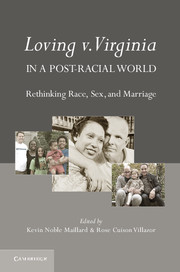Book contents
- Frontmatter
- Contents
- About the Contributors
- Acknowledgments
- Foreword
- Introduction Loving v. Virginia in a Post-Racial World
- Part One Explaining Loving v. Virginia
- Part Two Historical Antecedents to Loving
- Part Three Loving and Interracial Relationships: Contemporary Challenges
- Part Four Considering the Limits of Loving
- Part Five Loving Outside the U.S. Borders
- Part Six Loving and Beyond: Marriage, Intimacy, and Diverse Relationships
- Permission Granted
- Index
- References
Introduction - Loving v. Virginia in a Post-Racial World
Rethinking Race, Sex and Marriage
Published online by Cambridge University Press: 05 July 2012
- Frontmatter
- Contents
- About the Contributors
- Acknowledgments
- Foreword
- Introduction Loving v. Virginia in a Post-Racial World
- Part One Explaining Loving v. Virginia
- Part Two Historical Antecedents to Loving
- Part Three Loving and Interracial Relationships: Contemporary Challenges
- Part Four Considering the Limits of Loving
- Part Five Loving Outside the U.S. Borders
- Part Six Loving and Beyond: Marriage, Intimacy, and Diverse Relationships
- Permission Granted
- Index
- References
Summary
On June 16, 1967, the U.S. Supreme Court unanimously ruled that state laws prohibiting interracial marriage were unconstitutional. In this landmark case, Loving v. Virginia, the Court championed the rightful place of Fourteenth Amendment guarantees of equal protection and due process in the realm of marriage and family. As a result of the Court’s opinion, petitioners Richard Loving, a White man, and Mildred Jeter, a woman of color, could finally live in Virginia as a legally married couple. No longer would they – and other interracial couples who wanted to marry – be subject to the discriminatory regulations of the state that sought to maintain and police racial boundaries.
For most of American history, law not only placed restrictions on the selection of a marital partner, but also forged a collective definition of the legitimate family. At most, forty-one states enacted laws preventing interracial marriage, with the majority of jurisdictions banning Black-White unions. In a minority of other states, intermarriages between Whites and Asians, Latinos/as, or Native Americans were also prohibited. Racial classifications differed from state to state, thus allowing a “Black” person to cross state lines to find themselves categorized differently according to their blood quantum.
- Type
- Chapter
- Information
- Loving v. Virginia in a Post-Racial WorldRethinking Race, Sex, and Marriage, pp. 1 - 10Publisher: Cambridge University PressPrint publication year: 2012



